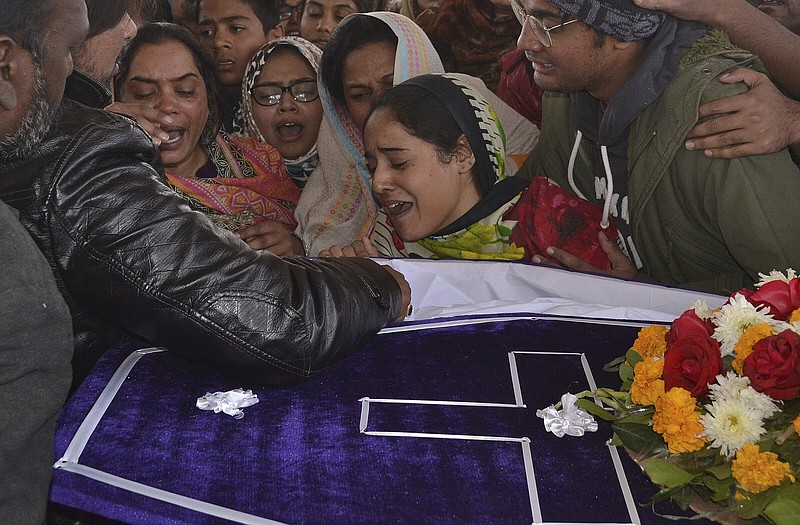Around the globe, religious freedom is under attack, the U.S. Commission on International Religious Freedom warned this week.
The bipartisan body recommended the State Department designate 17 nations as "countries of particular concern," meaning they engage in or tolerate "systematic, egregious, and ongoing violations of religious freedom" that is "particularly severe."
The list included five of the world's 10 most populous nations: China, India, Pakistan, Nigeria and Russia.
This year, Cuba and Nicaragua were added to the list, joining Afghanistan, Burma, Eritrea, Iran, North Korea, Saudi Arabia, Syria, Tajikistan, Turkmenistan and Vietnam.
Commissioners recommended that 11 other nations be placed on the State Department's "special watch list," citing "severe" religious freedom violations: Algeria, Azerbaijan, Central African Republic, Egypt, Indonesia, Iraq, Kazakhstan, Malaysia, Sri Lanka, Turkey and Uzbekistan.
Commissioner Frank Wolf, a former Republican congressman from Virginia, said that the persecution is intensifying.
Over the past year, "what has changed, clearly, is that things are worse all over the world. It's accelerating," he said Monday.
Increased trade ties between the U.S. and Beijing haven't resulted in greater religious freedoms there, he said.
"The conditions are much worse in China than they were last year and much more than a year before, and it just is out of control. Every faith group in China is is being severely persecuted," he said.
HUNDREDS IN JAIL
"The Catholic Church has been pressured and pushed around, and underground bishops are having a difficult time," Wolf said. "There are hundreds of Protestant pastors in jail, and in Tibet, there is cultural genocide."
"[There is] real genocide against the Uyghurs -- 1 [million] to 3 million in detention camps, in concentration camps -- and the Falon Gong are having a very difficult time," he said.
In the newly released report, Wolf and his eight fellow commissioners urged the Biden administration and Congress to "ban lobbying groups and law firms from representing the Chinese government and its interests."
"At the height of Cold War hostilities in 1980, it would have been unthinkable for any reputable firm to take on the Soviet Union as a client. And yet today, untold profits are being raked in by lobbyists willing to whitewash the record and aims of the Chinese Communist Party (CCP) and government. It's time to make this activity illegal," the commissioners wrote.
Fred Davie, one of the Democrats on the commission, said it's important for the United States to advocate for religious liberty because "there are so many people around the world who are believers."
"I think the countries where you find the greatest amount of religious freedom, you're going to find the greatest amount of thriving and flourishing and freedoms in general," he said.
"This world is pretty interconnected these days, and religious-based violence in one place can lead to religious-based violence in any number of other places," he said. "If you're going to have human flourishing, then people need to be able to worship freely -- or not worship at all -- without fear of retaliation or oppression."
Davie and other commissioners have highlighted tensions in Nigeria, Africa's largest nation.
"We've not only called for the State Department to designate it a country of particular concern, but also called on the State Department to appoint a special envoy to the Nigeria Chad Basin for the purpose of dealing with this ongoing religious-based violence that is ripping that country apart," Davie said.
Jim Carr, a Searcy resident and former commission member, said Christians face particularly severe persecution in Nigeria's predominantly Muslim north.
But there's bad news in plenty of other areas as well.
"It's a tough place in most of the world for religious freedom," he said. "I'm trying to think of a place where it is getting better, and I'm having trouble coming up with one."
Wolf, who served on Capitol Hill for 34 years, was first elected to Congress in 1980, the same year Ronald Reagan was elected president.
In the years that followed, he witnessed the fall of the Iron Curtain and the collapse of communism around much of the planet.
"We went through a period of time -- and I'm a great supporter of President Reagan-- where we were making great strides on freedom," Wolf said.
"The Soviet Union fell, Romania, Poland, Hungary, all kind of came toward freedom and religious freedom [and] democracy. [Now] it's all gone the other way. ... There almost is not a bright spot around the world," he said.
During his 17 terms, Wolf became one of Washington's leading champions of religious liberty.
In 1998, he helped secure passage of the International Religious Freedom Act, which created the commission and called for establishment of an ambassador at large for international religious freedom.
The Frank R. Wolf International Religious Freedom Act, which updated and expanded the initial legislation, was named in his honor and signed into law by President Barack Obama in 2016.
It's unclear whether Congress will act on the commissioners' call to outlaw lobbying on behalf of China.
But U.S. Sen. John Boozman, R-Ark., said lawmakers will be examining the recommendation -- and the rest of the report, as well.
"The Chinese Communist Party is a repressive regime whose treatment of any person or group, and particularly people of faith, it views as a threat to its power is condemnable. The U.S. Commission on International Religious Freedom is right to shine a light on its appalling behavior and question the credibility of anyone peddling influence on its behalf," he said in a written statement. "I look forward to discussing that question, and the entire report, with my colleagues in Congress and will continue pushing the Biden administration to call out China's troubling human rights record without reservation."
